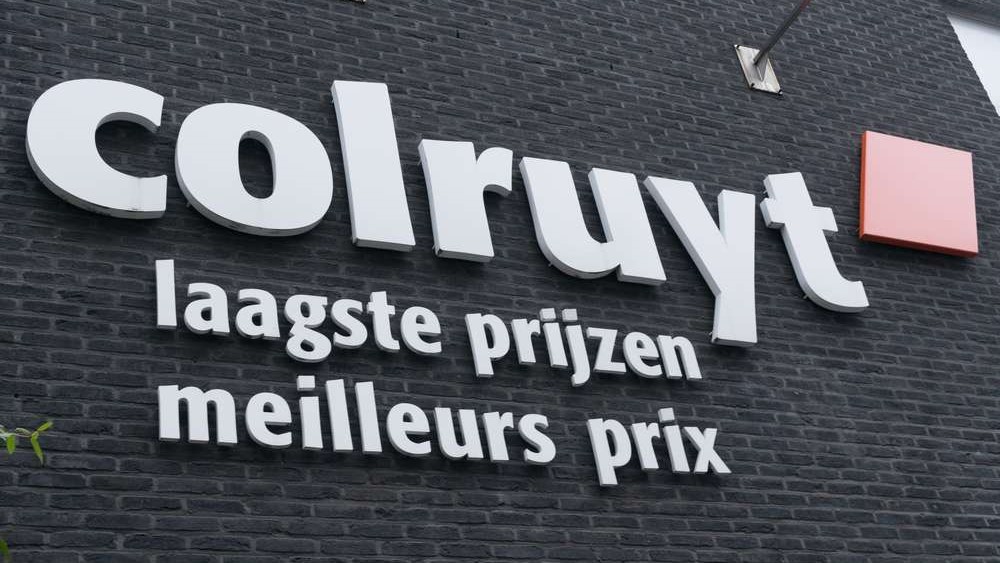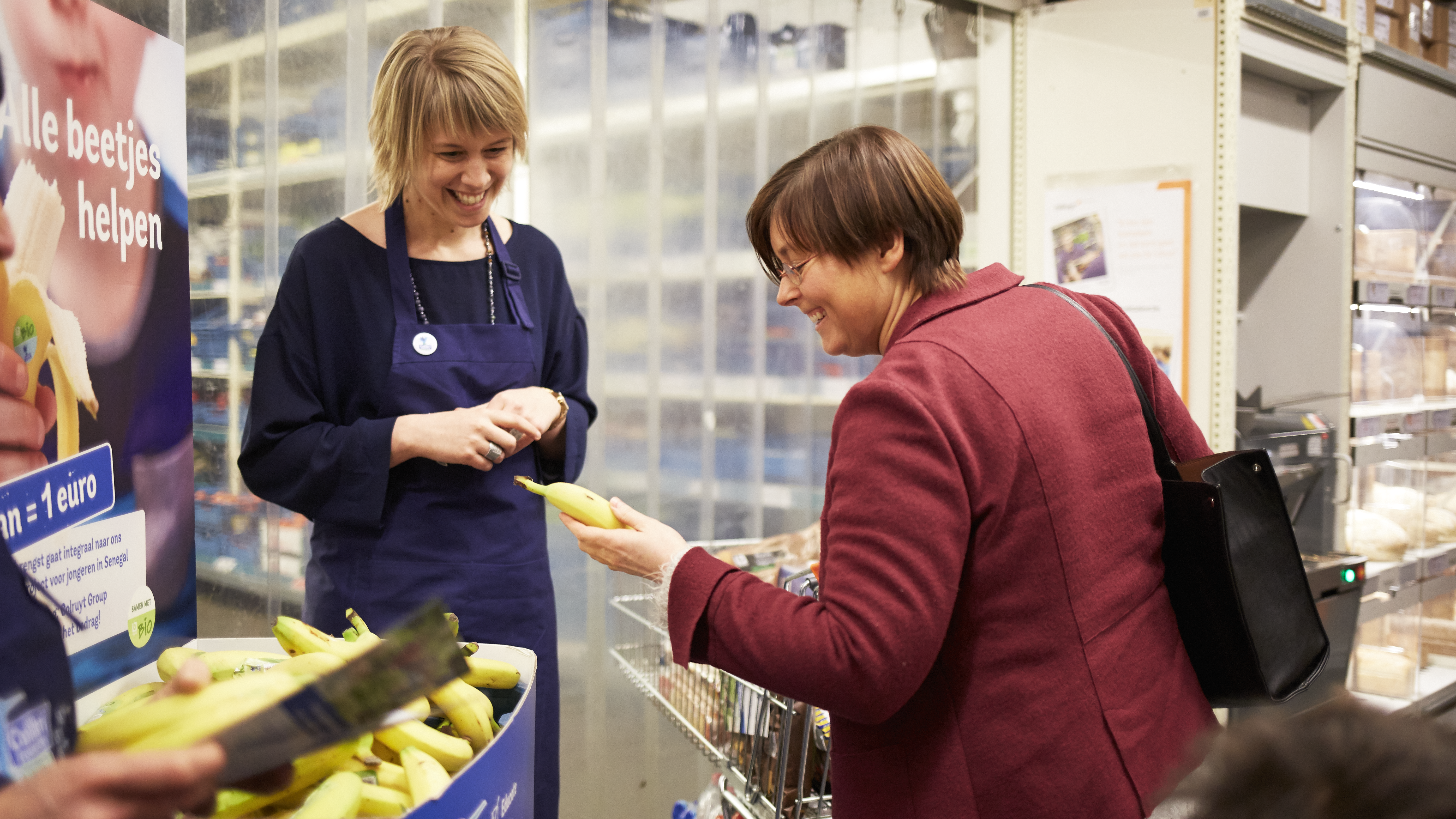With Colruyt, Bio-Planet and Okay, the Colruyt Group is one of the strongholds of Belgium’s retail sector. Does this holding which focuses on growth and profit have any attention for sustainable trade? Yes, indeed, so it seems. In addition to its supply of fair trade products, the Colruyt Group launched ‘value chain projects’ a few years ago in an attempt to ‘sustainabilify’ the producer-to-consumer value chain. Rice from Benin was its first project and currently Colruyt Group has undertaken to export bananas from Senegal. Philippe Toussaint and Johan Vandenbossche of Colruyt’s CSR (1)-team shed some light on Colruyt’s vision on sustainability.

Colruyt Group focuses on the main commodities (basic raw materials) such as fish, palm oil, soy, paper and exotics, because they have the strongest ecological and social impact. Philippe explains there are three ways to ‘sustainabilify’ a product category: “First of all, you can rely on existing certification systems: ASC, UTZ, Rainforest Alliance, etc. Secondly, you can develop a system of your own. For instance, in 2011, our fish supply was screened by an independent organisation, ILVO (2), and all threatened fish was removed from our assortment. Lastly, we have developed value chain projects with farmers in the South. This resulted in an opportunity to sell organic and fair trade bananas from Senegal. However, the problem for these farmers is accessing the international market. On top of that Senegal has never exported bananas to Belgium. To provide the farmers with a higher income and to organise themselves better, the Colruyt Group enters into long term purchase agreements for fixed and considerable volumes. If the cooperative succeeds in producing quality bananas, new market opportunities arise, also domestically.”
An often-heard concern of fair trade suppliers is the expensive fees that need to be paid to the organisations that guarantee fairness. Is a project in which you can control the value chain from the cooperative to the retail shelves a handy way to circumvent this intermediary step? Considering the major investments and intensive involvement, this should be considered differently. The launch is also a story of long-term commitments. The Colruyt Group committed to the project in 2013, along with Agrofair, Aprovag and Vredeseilanden (3). Quality is stabilising and the final goal is to achieve a qualitative and stable production. By 2017 we hope to sell the first Senegalese bananas in our stores.
Johan adds that the Colruyt Group launches value chain projects where farmers in the South cannot overcome market inequities on their own either for historical reasons or because of a lack of financial resources and expertise. “With the project partners we supported the farmers to meet organic and fair trade standards. For a cooperative engaging into a market economy it is quite a challenge to find financial resources or to prepare for a certification audit.”
Philippe: “We are in touch regularly with all the partners in the value chain. Every problem is discussed. Many issues have to be resolved and quality standards met to be certified. It is a long journey which requires investment.”
Johan: “NGOs or experts provide the farmers with the necessary training on irrigation, fertilisers and composting. We have a partner in Senegal who is familiar with banana cultivation in South America and who knows how to find agricultural experts. In Benin we looked for a university to provide support to the farmers to improve the quality of their rice and eventually exchanges and internships were organised between Benin and Belgium.”
Philippe: “The aim of the value chain projects is to make the organisation self-supporting in the long run; we make sure they don’t become dependent on one sole partner. For the banana project, export is a way to develop the business but we also encourage farmers to go to the domestic market in Dakar. At the same time, via the Collibri Foundation (4), we invest in training initiatives for farmers and youths from the Tambacounda region in the south-east of Senegal.”

Can the local population afford organic fair trade bananas? “Not necessarily,” claims Philippe. “Today, bananas are imported from Côte d’Ivoire. By working more efficiently and being more effective with fertilisers, yields per hectare increase. That, combined with better quality, makes them more competitive.” “In most developing countries there is a market among urban populations for quality products,” adds Johan, “unfortunately, cooperatives with which we set up projects usually operate in the bulk market of cheaper products, partially for quality reasons, partially because of inexperience.”
The Colruyt Group attaches great importance to the employment conditions of its producers. For a producer to operate under its brand, a code of conduct must be signed, based on rules of the UN’s International Labour Organization. This concerns, among others, the minimum age of workers, correct wages and safe and healthy employment conditions. The CSR team checks whether the producer is able to provide proof of this through existing databases such as the BSCI (5) or an independent audit. Johan and Philippe point out the trend of incorporating several sustainability aspects in one single certificate. “We notice that the Fairtrade standard picks up more ecological aspects,” says Johan. “A product without the Fairtrade label can also turn out to be fair,” adds Philippe. “With Vredeseilanden we started an asparagus project in Peru. It did not have an organic or fair trade label, but the farmers were paid a correct price and they paid attention to social and ecological matters.”
Already in 1990, Colruyt launched the Greenline charter to help reduce its ecological footprint through more efficient transport, reduced packaging, lower energy consumption in the stores and investments in wind and solar energy. Since 2010, the Colruyt Group has also focused on its sourcing. “By working out criteria, choosing for certain producers and developing value chain projects we can have a positive impact. The last step in the producer-retailer-consumer value chain is convincing the customer to be a responsible consumer, for instance by developing a good offer but also by disseminating information via folders, videos and labels.”

Bio-Planet offers more than 200 fair trade products such as coconut milk, rum, sesame seeds, quinoa and cocoa butter. Colruyt offers only 25 fair trade products, including wine; still, with 230 stores, the impact is significant. But how does the guaranteed minimum price for farmers compare with the low price guarantee to consumers? The answer is that Colruyt follows the market, regardless whether this is for organic, fair trade or conventional products. When Colruyt does not purchase a product at the lowest price, the margin will be lower. But the farmer does get the fair trade price nevertheless.
And is Colruyt just as committed to European dairy and pig farmers? Johan: “In these sectors we primarily see a problem of overproduction. Farmers have a tough time indeed, but mainly because they do not operate in a Belgian or European market any more but in a global market. You notice how sensitive we are to China suddenly purchasing less milk powder or Russia imposing a pear embargo.”
Philippe: “The problem with dairy and pig farmers is addressed through consultative platforms that target farmers, the processing middle segment and retailers. But these are economic phenomena that have to be resolved on a European and global level.”
Johan: “This issue arose at a debate last year: Either you set quota to control production, but everyone fears these, and of course someone will try to break the quota, or the farmer must develop an added-value product, such as pork with a special taste, to stay out of the bulk market. It is painful for a hardworking farmer to have to sell below the cost price. But these are market phenomena that you cannot avoid. In comparison, the farmers we work with in Tanzania are sitting on a gold mine: the demand for their passion fruit far exceeds the supply, so they are paid good prices. But for how long? To stabilise the market we can temporarily support our farmers, but where overproduction becomes the rule, this is untenable.”
Philippe: “At the end of the value chain, the consumer decides what to buy. It doesn’t work if you have a mass supply of fair trade or organic products, but you can’t find enough customers willing to pay extra for it.” “In certain categories there is an oversupply of fair trade compared to what is being sold,” admits Johan. “You have two independent groups: consumers and producers. Sometimes, there is a mismatch. We advocate setting up self-regulating structures and better monitoring of offer and supply by partners in the value chain.”
“Europe recently launched a project to measure a product’s footprint,” reacts Philippe. “It includes 14 different parameters. But where one parameter improves, another one might get worse. The question is: which criterion deserves most weight? Each certification system focuses on only a few of these parameters. We don’t actually speak about ‘sustainable products’ but about ‘how to sustainabilify processes’ because we are continuously looking for improvement. When we have improved one criterion, we move on to a next challenge.”


